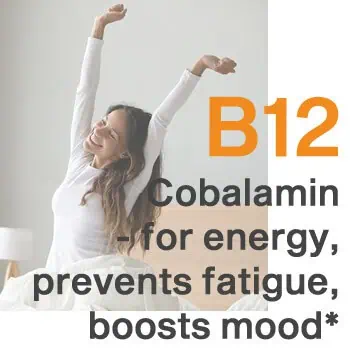Reap the Health Benefits of B Vitamins
Activated B-Complex by Pure Prescriptions offers an affordable full spectrum of the necessary B vitamins in their activated form providing superior absorption. This formula stands apart from other brands by using Quatrefolic®, the leading form of activated folic acid without harmful fillers, food dyes or sugars.
What Is B-Complex?
The vitamins that make up B complex are thiamine (vitamin B1), riboflavin (vitamin B2), niacin (vitamin B3), pantothenic acid (vitamin B5), pyridoxine (vitamin B6), biotin (vitamin B7), folate (vitamin B9) and cobalamin (vitamin B12).
The B vitamins help enzymes in our bodies do their jobs and are important for a wide range of cellular functions, like breaking down carbohydrates and transporting nutrients throughout the body. They are most valued for their ability to help turn other nutrients into energy, maintain a healthy metabolism, and for supporting nerve function, liver function, skin health, eye health and fetal growth/development during pregnancy. B vitamins also play an inter-related role in keeping our brains running properly. Adequate amounts of B vitamins in the body are essential for optimal physiological and neurological functioning.
Top Health Benefits of B Vitamins
Vitamin B1, or thiamin, helps prevent complications in the nervous system, brain, muscles, heart, stomach, and intestines. It is also involved in the flow of electrolytes into and out of muscle and nerve cells.
Like other B-complex vitamins, thiamine is sometimes called an “anti-stress” vitamin because it may strengthen the immune system and improve the body’s ability to withstand stressful conditions. It is named B1 because it was the first B vitamin discovered. It helps prevent diseases such as beriberi, which involves disorders of the heart, nerves, and digestive system.
Patients who may receive thiamin to treat low levels of vitamin B1 include those with peripheral neuritis, which is an inflammation of the nerves outside the brain, or pellagra.
Vitamin B2, or Riboflavin, is a vitamin that is needed for growth and overall good health. It helps the body break down carbohydrates, proteins and fats to produce energy, and it allows oxygen to be used by the body.
In addition to producing energy for the body, riboflavin works as an antioxidant, fighting damaging particles in the body known as free radicals. Free radicals can damage cells and DNA, and may contribute to the aging process. Antioxidants, such as riboflavin, can fight free radicals and may reduce or help prevent some of the damage they cause.
Several studies suggest taking Riboflavin may help people who get migraines by reducing how often they get migraines and how long the migraines last.
Vitamin B3, or niacin, is great to have in your diet. Not only is it good for metabolism – but it can also help with cholesterol levels. Research suggests that vitamin B3 can increase “good” cholesterol while also decreasing “bad” cholesterol levels.
Niacin is a vitamin that acts as an antioxidant and plays a role in cell signaling and DNA repair. Deficiency is characterized by skin problems, dementia and diarrhea. Niacin can be used as an oral or lotion to prevent damage to skin cells from sunlight. it has also been found to improving joint mobility, and reduce the need for nonsteroidal anti-inflammatory drugs.
The health benefits of vitamin B5, also known as pantothenic acid, include the alleviation of conditions like asthma, hair loss, allergies, stress and anxiety, respiratory disorders, and heart problems.
Vitamin B5 also helps boost immunity, reduce osteoarthritis and signs of aging, increase resistance to various types of infections, stimulates physical growth, and manage skin disorders.
Vitamin B5 acts as a synthesizer of many important components required by the human body. For instance, it is essential for the formation of fats, proteins, carbohydrates, amino acids, and antibiotics, while also stimulating adrenal hormones.

Pregnant women need vitamin B6, or pyrdoxine, for brain development and supporting immune functions. The supplement of the vitamin is used to women for dealing with premenstrual syndrome, depression and for menopause syndromes.
Vitamin B6 is part of the vitamin B complex. It plays a vital role in many functions of the body. It helps in detoxification of the liver, strengthens the blood vessels, relieves mood swings, and cures anemia and boosts neurotransmitters that are the messenger for taking brain signal to the central nervous system of the body.
The deficiency of vitamin B6 leads to fatigue, weakness in muscles, irritability, and erectile difficulties in males. We need to consume B6 on a regular basis, as it is a water soluble vitamin and is flashed out of the body. It is one of the 8 important vitamins that are essential for cardiovascular health, immunity and metabolism.
Biotin has been shown to be important for many health factors including supporting neurological functions, steadying blood sugar levels, DNA stability, and hair, skin and nail health.
Vitamin B7, more commonly known as biotin, is a water-soluble vitamin that is vital for the body’s metabolism and functioning. It is an essential component of a number of enzymes responsible for several crucial metabolic pathways in the human body, including the metabolism of fats and carbohydrates, as well as amino acids involved in protein synthesis.
Biotin is known to promote cell growth and is often a component of dietary supplements used for strengthening hair and nails, as well as those marketed for skin care.

Folate is a water-soluble B-complex vitamin that is found in a variety of vegetables, legumes, pulses and animal foods.
Folate is essential in our body for brain development, red blood cell production, amino acid metabolism and DNA synthesis.
Folate helps to form DNA and RNA and is involved in protein metabolism. It plays a key role in breaking down homocysteine, an amino acid that can exert harmful effects in the body if it is present in high amounts. Folate is also needed to produce healthy red blood cells and is critical during periods of rapid growth, such as during pregnancy and fetal development.

Vitamin B-12 (also known as cobalamin) has been used to enhance mood, increase energy, improve memory, stimulate the immune system, promote healthy sleep, and slow the aging process. It has long been regarded as playing a pivotal role in metabolism and cellular energy production.
Vitamin B-12 is vital to the body’s proper functioning.It plays an essential role in the formation and metabolism of your red blood cells (RBCs), as well as in your ability to produce DNA (the genetic material in your cells).
In regards to your nerve cells, vitamin B12 helps maintain their overall health and works to form their protective covering, known as the myelin sheath. At the same time, vitamin B12 helps to prevent you from developing megaloblastic anemia, which is characterized by extreme tiredness and weakness.
The Eight Vitamins, B1, B2, B3, B5, B6, B7, B9, B12 Are Collectively Known as “The B-Complex.”
All eight of these B vitamins are essential nutrients help convert our food into fuel, allowing us to stay energized throughout the day. While many of the following vitamins work in tandem, each has its own specific benefits — from promoting healthy skin and hair to preventing memory loss or migraines and much more.
What do B vitamins do in the system? They do many things. They’re important building blocks for your neurotransmitters. Neurotransmitters are biochemical messengers in the brain. They have names like serotonin, which I’m sure you’ve heard of, and GABA and dopamine. And their production depends on B vitamins such as B-6 ,B-12, and folate.
When these nutrients are insufficient, it will influence your body’s ability to synthesize neurotransmitters. In this way people can develop mood disorders just because of B vitamin deficiencies. They can have cognitive issues or memory issues. In more severe cases, they can have neurodegeneration, deterioration of the neurons, which can lead to chronic neurological conditions. And all they really needed was B vitamins. And yet these are insufficient in many people and very often overlooked in standard primary care medicine.
-Dr Chad Larson
Why do we need B-Complex?
Over the past century food manufacturers have been producing cereal products and bread that are highly palatable and clean looking. Disappointingly, these foods get stripped of their bran and germ. As a result, they are also almost devoid of B-complex vitamins.
Due to this process, naturally occurring B-complex vitamins are almost absent from most white bread, pasta, breakfast cereals, and other foods made of simple, highly processed carbohydrates.
While most manufacturers add exogenous B vitamins (B vitamins from other sources) to their products, these are not in the perfect balance as nature intended. Due to this most adults could benefit from B-complex vitamins.









